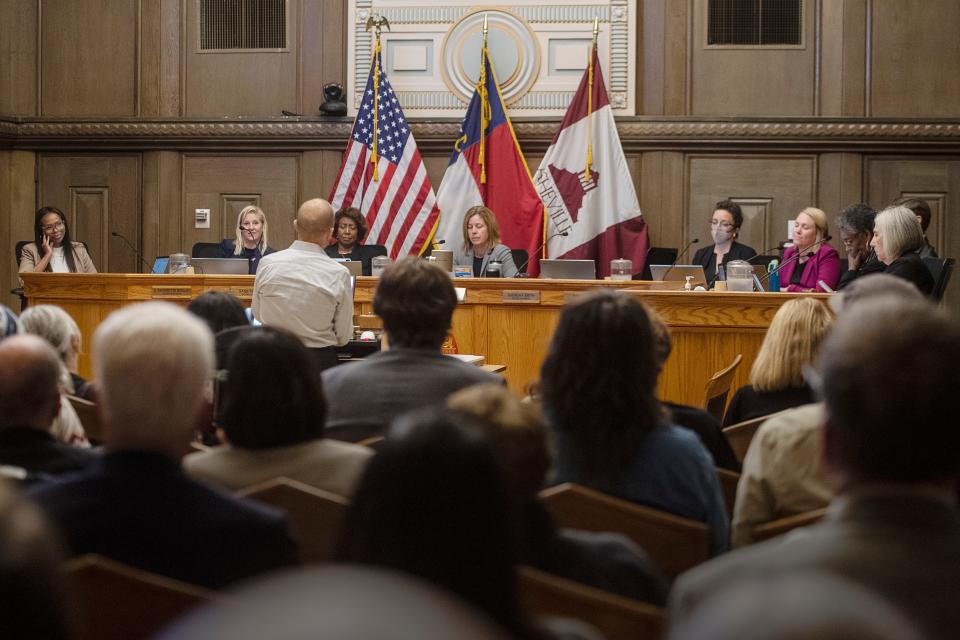City owned Asheville facilities get 'C' grade: New study will map a future vision

ASHEVILLE - An evaluation of nearly all city facilities earned Asheville's aging infrastructure a 'C' grade, Capital Project's Walter Ear told City Council Oct. 10. With some buildings operating at a space deficit and large projects looming, a $500,000 comprehensive facilities study tackles the next 20 years of essential city spaces.
“Not great, not horrible. It’s about what we expected," Ear, the city's building construction program manager, said of the grade.
An actionable 20-year facilities master plan will chart the future of some of Asheville's most recognizable landmarks, from the Art Deco splendor of City Hall, completed in 1928; to the 1926 downtown Municipal Building, built by Black builder James Vester Miller; and the Thomas Wolfe Auditorium, which is looking at a possible massive renovation project.
The assessment evaluated the condition of nearly 1 million square feet across 82 city facilities and was graded by a subcontractor for Cary-based Brightly Software, which held one of the two contracts with the city for the study.
But in the next two decades, the city's current $1 million spent annually on maintaining facilities isn't going to cut it. In a matter of years, if funding stays level, that 'C' will begin to drop rapidly toward an 'F.'
As Ear puts it, facilities will find themselves in a "nearly failed state."
To maintain existing service levels, Ear said, the city would need to budget $3.5 million annually for maintenance, which doesn't include growth, improvement, additions or building replacement.
City Manager Debra Campbell said the $3.5 million, still more than double the city's current investment, would mean simply "status quo."
"There are lots of needs," Campbell said in introducing the Oct. 10 work session. "We think we have a way that we can address those needs. But it’s going to take time.”

Background of the study
The city's last facility assessment was in 2017, but was "condition" only, not a comprehensive study. The new assessment, funded in the fiscal year 2022 budget, will form the basis for long-range capital planning, "mapping" a future plan while prioritizing and sequencing maintenance.
More than 70% of city-owned facilities are older than their expected useful lives, Jade Dundas, director of Capital Projects, said in 2022.
Despite the Oct. 10 work session on the assessment, with another to follow Nov. 14, Dundas told the Citizen Times that the report is not currently final. It will be made publicly available "within the next couple months," he said, after it is finalized and "reviewed for safety sensitive content."
The half-million dollar budget was split into two parts, Dundas said: a $148,000 contract with Brightly for the facility condition assessment and Capital Predictor software, and a $348,000 contract with Charlotte-based Creech and Associates for "everything else," including space needs analysis, individual site master planning, comprehensive capital planning and delivery of the final report.

As Ear pointed out, before you get to a ribbon cutting, there's about six years of work that precedes it, including land acquisition, environmental clearance, design, bidding, construction and more. And that's assuming funding development and allocation are already in place.
“As this is happening, we need to do something with the existing space. Whether it’s to relocate or expand, or renovate the spaces,” Ear said. It's relatively straightforward for a single project, but far more complicated to apply the sequence to multiple facilities, like the 137 tracked by the city.
Next steps
Council member Maggie Ullman called the presentation "amazing progress," leveling up staff's ability to continue caring for the city's infrastructure.
“We’ve done such a good job for a long time,” she said, even on a "shoestring" budget. “I feel like this type of work is really helping them do even better, because we need to be investing more and making the case for it."
The October work session reviewed growth forecasting, space needs, maintenance and sustainability. In November, staff will take council beyond the $3.5 million needed to maintain services, looking closer at specific projects, budgets and a possible sequence of work.
More: Asheville residents allege ADA noncompliance of downtown parking deck; How bad is it?
More: Asheville City Council OKs downtown bike lanes amid heated discussion
Sarah Honosky is the city government reporter for the Asheville Citizen Times, part of the USA TODAY Network. News Tips? Email shonosky@citizentimes.com or message on Twitter at @slhonosky. Please support local, daily journalism with a subscription to the Citizen Times.
This article originally appeared on Asheville Citizen Times: City-owned Asheville facilities earn a 'C' grade: New study
